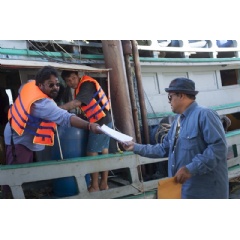Thai Union Completes Third-Party Audit on Thai Fishing Vessels
Thai Union Group PCL., with the support of several of its customers, recently completed its first industry collaborative third-party audit, conducted by global safety consulting and certification company UL, on some Thai commercial fishing vessels supplying the company’s business.
The third-party audit was conducted in line with SeaChange®, Thai Union’s sustainability strategy established to drive meaningful improvements across the entire global seafood industry.
It included 240 vessels in its sample size and helped identify potential labor and human rights abuses, as well as to improve performance of the Thai fleet by creating a targeted action plan based on its results, according to Paul English, Thai Union’s group president for pet care.
“This is a good example of how industry is able to come together and lead in the fight to address problematic issues in a way that it is sustainable, as well as improve labor and ethical performance in the fishing sector,” said English.
As a result of the audit, Thai Union learned many vessels often need more guidance and support on issues such as worker contracts and human rights policies, as well as the key findings noted below. The results of the audit will be used to put in place vessel improvement projects to raise the standard of suppliers to Thai Union.
KEY FINDINGS
- Lack of policies and procedures in place, including, for example, covering child labor, forced labor, recruitment fees, human trafficking or human treatment.
- Many vessels did not provide a copy of labor contracts to crew, and contracts were poorly understood by workers.
- Retention of document (passport and seaman book) by the vessel owner is a common practice at sea.
- Most of the vessels pay workers by cash, instead of direct deposit. *
- For many vessels with consecutive fishing days over 20 per month, a seventh day of rest was not provided on a regular basis to workers.
- Poor standard of health and safety equipment observed upon vessels.
* Note that since the audits took place the Royal Thai Government has regulated that fishers must be paid monthly by electronic bank payments, which will address this problem.
Follow-up training to address the key issues raised is planned for later in 2018. The training program will focus on building capacity within the Thai fishing industry and promoting good practices. Further, it will be held in collaboration with labor partners such as the International Labour Organization (ILO) and the International Transport Workers’ Federation (ITF).
Thai Union and its customers believe that engagement and capacity building represent the best opportunity to improve outcomes for fishers working in the Thai seafood sector.
Thai Union, which earlier this year introduced its Fishing Vessel Improvement Program (VIP) and Vessel Code of Conduct (VCoC) to provide clear guidance to the fishing vessels from which it sources, reserves the right to request verification of the level of compliance of a supplier to its VCoC, such as through third-party audits similar to this initiative, at any point during business transactions. Additionally, a rolling annual audit program in accordance with the VCoC will be conducted by Thai Union.
Thai Union’s existing and new suppliers are required to sign the VCoC in order to conduct business with the company, ensuring it is applicable to all fishing vessels in the company’s supply chain.
“Without the ongoing investment in improvement, auditing alone is unlikely to lead to improved performance against the baseline measures. Thai Union is dedicating significant resources for auditing to understand the issues as part of our risk management procedures,” said Dr. Darian McBain, Thai Union’s global director for sustainable development. “Further, education and capacity building in collaboration with our partners is essential to our efforts to ensure fishing industry workers are safe, legally employed and empowered, and that vessels are legal and operate responsibly.”
###
ABOUT THAI UNION GROUP
Thai Union Group PCL is the world’s seafood leader bringing high quality, healthy, tasty and innovative seafood products to customers across the world for more than 40 years.
Today, Thai Union is regarded as the world’s largest producer of shelf-stable tuna products with annual sales exceeding THB 135 billion (US$ 4.03 billion) and a global workforce of over 49,000 people who are dedicated to pioneering sustainable, innovative seafood products.
The company’s global brand portfolio includes market-leading international brands such as Chicken of the Sea, John West, Petit Navire, Parmentier, Mareblu, King Oscar, and Rügen Fisch and Thai-leading brands SEALECT, Fisho, Qfresh, Monori, Bellotta and Marvo.
As a company committed to innovation and globally responsible behavior, Thai Union is proud to be a member of the United Nations Global Compact, and a founding member of the International Seafood Sustainability Foundation (ISSF). In 2015, Thai Union introduced its SeaChange® sustainability strategy.
Thai Union’s on-going work on sustainability issues was recognized by its inclusion in the Dow Jones Sustainability Index Emerging Markets (DJSI) in 2014. In 2017, Thai Union was named to the DJSI for the fourth consecutive year. Thai Union is also part of the FTSE4Good Emerging Index.
( Press Release Image: https://photos.webwire.com/prmedia/6/225871/225871-1.jpg )
WebWireID225871
This news content was configured by WebWire editorial staff. Linking is permitted.
News Release Distribution and Press Release Distribution Services Provided by WebWire.
